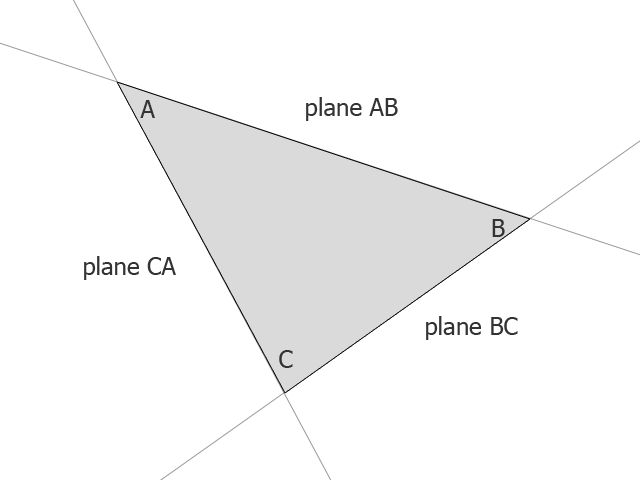Algorithm to determine if a point is inside a t...
A couple of months ago I published an algorithm to determine if a point is inside a square with mathematics (no hit test involved).
Are you ready for some more maths? This time I am publishing an algorithm to determine if a point is inside a triangle.
Although checking if a point is inside “something” may seem just a programming exercise, during next days I will show you how many awesome things you can do with it.
The idea is simple. Given an ABC triangle, every side cuts the plane in two. We can say a point is inside a triangle when its position in all three planes is on the same side of the triangle, or when it’s not in any plane on the opposite side of the triangle.
Look at this picture:
We can say a point is inside the triangle when it’s outside of plane AB, outside plane BC and outside plane CA, or inside “rest of the world”-plane AB, inside “rest of the world”-plane BC and inside “rest of the world”-plane CA.
This is what we are going to do:
|
1
2
3
4
5
6
7
8
9
10
11
12
13
14
15
16
17
18
19
20
21
22
23
24
25
26
27
28
29
30
31
32
33
34
35
36
37
38
39
40
41
42
43
44
45
46
47
|
package
{
import
flash
.
display
.
Sprite
;
import
flash
.
geom
.
Point
;
import
flash
.
events
.
Event
;
import
flash
.
events
.
MouseEvent
;
public
class
Main
extends
Sprite
{
private
var
A
:
Point
;
private
var
B
:
Point
;
private
var
C
:
Point
;
var
triangleCanvas
:
Sprite
=
new
Sprite
(
)
;
public
function
Main
(
)
{
triangleCanvas
=
new
Sprite
(
)
;
addChild
(
triangleCanvas
)
;
drawTriangle
(
null
)
;
stage
.
addEventListener
(
MouseEvent
.
CLICK
,
drawTriangle
)
;
addEventListener
(
Event
.
ENTER_FRAME
,
update
)
;
}
private
function
drawTriangle
(
e
:
MouseEvent
)
:
void
{
A
=
new
Point
(
Math
.
random
(
)
*
600
+
20
,
Math
.
random
(
)
*
440
+
20
)
;
B
=
new
Point
(
Math
.
random
(
)
*
600
+
20
,
Math
.
random
(
)
*
440
+
20
)
;
C
=
new
Point
(
Math
.
random
(
)
*
600
+
20
,
Math
.
random
(
)
*
440
+
20
)
;
}
private
function
update
(
e
:
Event
)
:
void
{
var
mousePoint
:
Point
=
new
Point
(
mouseX
,
mouseY
)
;
triangleCanvas
.
graphics
.
clear
(
)
;
if
(
isInsideTriangle
(
A
,
B
,
C
,
mousePoint
)
)
{
triangleCanvas
.
graphics
.
lineStyle
(
1
,
0xFF0000
)
;
}
else
{
triangleCanvas
.
graphics
.
lineStyle
(
1
,
0x000000
)
;
}
triangleCanvas
.
graphics
.
moveTo
(
A
.
x
,
A
.
y
)
;
triangleCanvas
.
graphics
.
lineTo
(
B
.
x
,
B
.
y
)
;
triangleCanvas
.
graphics
.
lineTo
(
C
.
x
,
C
.
y
)
;
triangleCanvas
.
graphics
.
lineTo
(
A
.
x
,
A
.
y
)
;
}
private
function
isInsideTriangle
(
A
:
Point
,
B
:
Point
,
C
:
Point
,
P
:
Point
)
:
Boolean
{
var
planeAB
:
Number
=
(
A
.
x
-
P
.
x
)
*
(
B
.
y
-
P
.
y
)
-
(
B
.
x
-
P
.
x
)
*
(
A
.
y
-
P
.
y
)
;
var
planeBC
:
Number
=
(
B
.
x
-
P
.
x
)
*
(
C
.
y
-
P
.
y
)
-
(
C
.
x
-
P
.
x
)
*
(
B
.
y
-
P
.
y
)
;
var
planeCA
:
Number
=
(
C
.
x
-
P
.
x
)
*
(
A
.
y
-
P
.
y
)
-
(
A
.
x
-
P
.
x
)
*
(
C
.
y
-
P
.
y
)
;
return
sign
(
planeAB
)
==
sign
(
planeBC
)
&&
sign
(
planeBC
)
==
sign
(
planeCA
)
;
}
private
function
sign
(
n
:
Number
)
:
int
{
return
Math
.
abs
(
n
)
/
n
;
}
}
}
|
And this is the result: click the mouse to draw a random triangle, move the mouse inside the triangle to turn it red.
Download the source code.
